Suu Kyi's cowardly speech
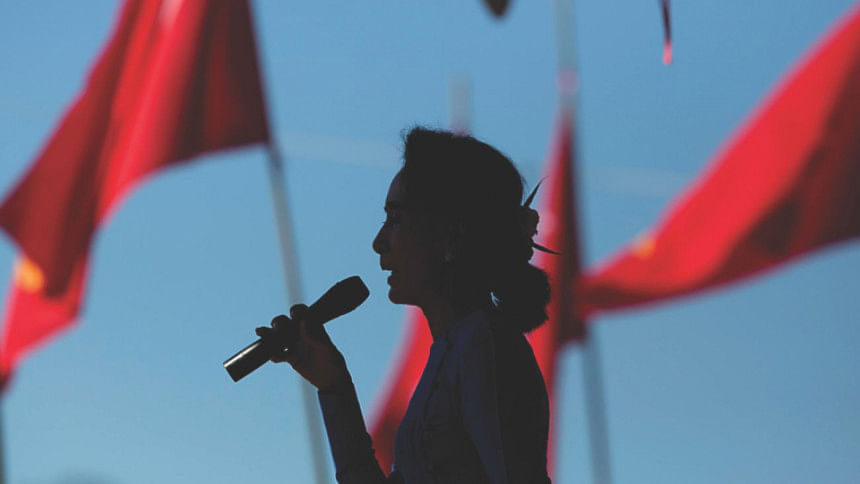
The de facto leader of our next-door neighbour, Aung San Suu Kyi's address on Tuesday surprised no one. She echoed the same old rhetoric that has been used time and again to displace the Rohingyas. The use of carefully crafted semantics in her much-awaited public speech on the mass exodus of Rohingyas that began in late August lent a softer tone to Myanmar's otherwise hostile attitude. She reinforced her government's commitment to restore "peace, stability and rule of law", invited her foreign friends to "join us in our endeavours" and said that visits can be arranged so that those who have chosen to stay back in their villages can tell the world why they have not fled. Her speech would give one the impression that the Myanmar government is finally taking a conciliatory approach to resolving the crisis—that is, if you ignore the multitude of baseless assertions disguised as facts and figures.
As journalists, aid workers, volunteers, and law enforcement officials in Bangladesh duly do their part to bring some relief to the refugees who have witnessed more violence than anyone should in a lifetime, Suu Kyi presented "facts" concocted by her government that basically sent the message "it's not as bad as it looks." Making sure to not once refer to the refugees as "Rohingya", with the exception of using the word only when talking about ARSA (Arakan Rohingya Salvation Army), Suu Kyi and her government want the world to know that the term "Rohingya" must be used only when referring to a terrorist group. Forget citizenship—terrorism is the only thing that the Myanmar government is willing to attribute to the entire Rohingya population.
A list of the numerous claims made by Suu Kyi has been compiled and debunked by CNN. This includes her assertions that "the great majority of Rakhines have not joined the exodus" and "50 percent of the villages of Muslims are intact." Her conscious choice of not using the word "Rohingya" and referring to them simply as "Muslim" makes it hard to verify whether she is talking about the Rohingyas or the state's entire Muslim population. She also said that Muslims have access to the same education and healthcare services as the non-Muslim population, which we know is an outright lie unless you think the hundreds of reports documenting the discrimination and dispossession of the Rohingya population over the years are all false.
But Suu Kyi's complete disregard for truthfulness was perhaps displayed by her assertion that, "Since the fifth of September, there have been no armed clashes and there have been no clearance operations." Analysis of satellite imagery by Amnesty International revealed that Rohingya villages were burnt even after September 5, and photos taken after that date by different agencies and photojournalists of this newspaper from the Bangladesh side of the border show columns of smoke rising from villages (including those of Maungdaw district). Without full investigation into the origin of the fires—Amnesty International termed it Myanmar government's "scorched-earth policy"—Suu Kyi's claims, which essentially sanitise the wholesale destruction of Rohingya villages by the Tatmadaw, are laughable.
The Bangladesh government knows full well that they have taken on a monumental undertaking. The maelstrom of fleeing refugees in our south-eastern border has made one thing clear: we are not prepared to shoulder the responsibility of this massive humanitarian crisis alone. At a time when we are still reeling from the devastating effects of the monsoon floods, resulting in a humanitarian crisis of its own with a third of the country under water, the exodus of more than 400,000 Rohingya refugees at the Bangladesh-Myanmar border is the last thing we needed. With refugee camps bursting at the seams and relief efforts haphazard at best, tackling this humanitarian disaster is proving to be unimaginably difficult.
But the plight of the Rohingyas has always registered sympathy in Muslim-majority Bangladesh. The Bangladesh government's courageous move to open its borders deserves all the praise. And why not? For a resource-strained country that was already hosting some 500,000 Rohingyas prior to the latest round of mass exodus, sheltering thousands more was not an easy choice.
Bangladesh is not a party to the 1951 UNHCR Refugee Convention or the 1967 protocol, and, as such, is under no legal obligation to host refugees. (Although there exist multiple international treaties that Bangladesh is a signatory to, these are not enforceable in a court of law.) But a legal commitment, or rather the absence of it, is meaningless in the face of the enormous human tragedy on the other side of the border. With our back against the wall, we had to open our borders. And we did the right thing.
Refugee arrivals might have slowed down to a trickle but the real work has only just begun. Aid agencies are overwhelmed. The conditions are dire. Camps are overpopulated, with families cramped in makeshift tents that leak during the rain making it impossible to sleep. Children are going days without food. People wait in long queues only to return empty-handed. The water, sanitation and health situation is just as abysmal. Now that the focus has somewhat shifted from the macro to the micro i.e. from the unprecedented influx of Rohingya refugees to the herculean task of actually dealing with the crisis (containing spread of diseases, coordinating aid, etc.), new issues are surfacing every day.
But despite all that we have done and are doing, Suu Kyi, in her first public speech since August 25, far from acknowledging the need to work with the Bangladesh government and the latter's concerns as a nod of respect, chose to denounce "all human rights violations"—straight out of the "All Lives Matter" playbook. Suu Kyi's speech was not only "disappointing" but also cowardly. It towed the typical line of "we have to look at both sides", completely oblivious to the power dynamics at play: the national army versus a dispossessed population.
Then there's the façade of not fearing "international scrutiny" which is simply another rhetorical tool to dismiss legitimate criticism. Why did Suu Kyi then fail to be present at the UN General Assembly if there's nothing to be afraid of? Her "well-thought-out" speech, laced with lie after lie, goes to show that Myanmar's intentions with respect to the Rohingyas are not going to change anytime soon. And we shouldn't fall for it.
Nahela Nowshin is a member of the editorial team, The Daily Star.



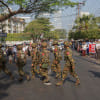
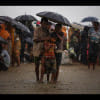
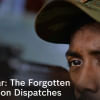

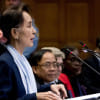


Comments